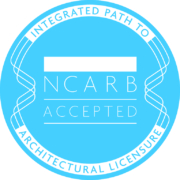Jumpstart Your Career in Architecture by Enrolling in an IPAL Program
By NCARB
Created by the National Council of Architectural Registration Boards (NCARB) in 2015, the Integrated Path to Architectural Licensure (IPAL) offers a dynamic, innovative path to licensure for students who are dedicated to becoming an architect. By integrating the opportunity to gain the real-world experience necessary to complete the Architectural Experience Program® (AXP®) and ensuring that each IPAL student can take all six divisions of the Architect Registration Examination® (ARE®), students who graduate from IPAL options are eligible for licensure soon after graduation.
STREAMLINING THE PATH TO LICENSURE
When NCARB first began exploring the IPAL concept in 2013, becoming an architect took an average of 14 years—from the time a student enrolled in school to the moment they received a license. Currently, earning a license typically takes just over 12 years; in part, because emerging architects are already overlapping their education, experience, and examination requirements in increasing numbers.
IPAL has been facilitated by NCARB’s work with licensing boards and architect volunteers to streamline its programs, enabling students to navigate licensure in a more structured and time-efficient manner.
BENEFITS OF BEING AN IPAL STUDENT
By integrating the education, experience, and examination requirements of licensure, IPAL helps students prepare for life after college by:
- Connecting education to current architectural practice
- Jumpstarting their careers with work experience and networking
- Making students eligible for licensure after graduation by completing licensure requirements
- Opening up career opportunities through licensure
- Helping students manage the financial burden of earning a degree, both by interweaving paid employment opportunities around academic requirements and by qualifying them for higher paying positions
In 2018, three students from the University of Florida’s CityLab-Orlando IPAL option became the first to meet national requirements for licensure while earning a degree. As IPAL graduates, Justin Jablonski, Michael Germano, and Phillip Lantry—who each earned a Master of Architecture—received their licenses just weeks after commencement.
When researching potential schools, Germano was looking for a program that would support his professional goals. “CityLab encouraged us to press forward and earn our licenses as soon as possible,” he said. “The economy could turn, but with a license, you will always have the ability to create work for yourself—to revitalize and redefine your career.”
Meet the First IPAL Graduates
IPAL PROGRAMS AND PARTICIPATING SCHOOLS
Since IPAL launched, NCARB has accepted 26 programs at 21 colleges from around the country, including Boston Architectural College, North Carolina State University, and the NewSchool of Architecture & Design—all with IPAL program graduates. And many architecture firms are learning the benefits of hiring IPAL students.
“The Integrated Path toward Licensure project brings together the study and practice of architecture in a fashion that encourages students to reconsider the office as a learning environment. It is an experience that matures the student in such a way as to enrich their study of architecture as they will be more able to understand the implications of design concepts. And, it normalizes the path toward licensure making the profession more accessible,” said Dean of North Carolina State University ’s College of Design, Marvin Malecha, FAIA, DPACSA.
Many participating schools have also issued statements regarding their participation in the program.
As an added benefit, each IPAL option has a designated IPAL advisor dedicated to offering guidance at your NAAB-accredited program. Your advisor will be able to guide you through IPAL enrollment and other school-related aspects of participating in IPAL. You’ll also have an architect licensing advisor, who will help answer any questions you may have about the AXP and the ARE.
IPAL FAQs
If you are considering enrolling in an IPAL program, be sure to read these FAQs before you get started.
ARE ALL IPAL OPTIONS THE SAME?
No. To be accepted into the IPAL initiative, programs must ensure that participating students are able to complete the AXP and take each division of the ARE prior to graduation. It is up to the individual programs to determine how to best interweave experience and examination into their existing curricula. Some schools offer students assistance in finding employment that qualifies for the AXP, while others do not—check out the list of programs offering IPAL options and visit their websites to learn more about how they manage education, experience, and examination.
DO ALL IPAL GRADUATES QUALIFY FOR LICENSURE?
In most jurisdictions, earning a NAAB-accredited degree, completing the AXP, and passing the ARE will qualify you for architecture licensure. However, some jurisdictions have additional requirements, such as a jurisdiction-specific test. You can learn more about the requirements in your jurisdiction by using our Licensing Requirements Tool.
WHAT FEES ARE ASSOCIATED WITH PARTICIPATING IN IPAL?
While NCARB does not charge a fee for participating in IPAL, students may encounter extra costs. Students will also need to pay the fees associated with NCARB’s AXP and ARE programs.
DO ALL JURISDICTIONS ACCEPT IPAL?
No. Each U.S. jurisdiction sets its own education, experience, and examination requirements for initial licensure. Not all jurisdictions currently accept divisions of the ARE passed prior to graduation; however, many boards are in the process of updating their laws and rules to accept IPAL.
By providing a holistic approach to earning a degree, gaining professional experience, and taking ARE 5.0, IPAL ultimately allows any student to get a head start in their architectural career.
For more information and testimonials on IPAL programs, visit the NCARB website.

IPAL seal courtesy of NCARB



